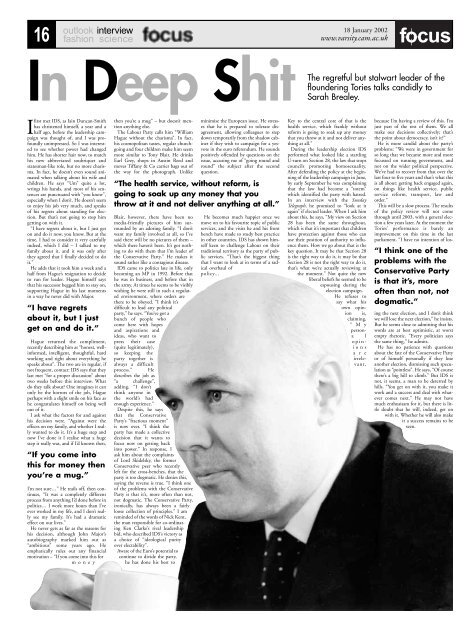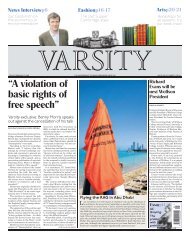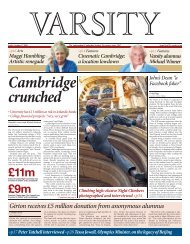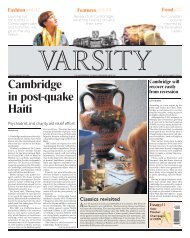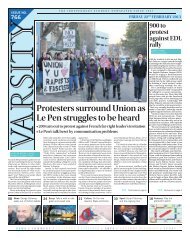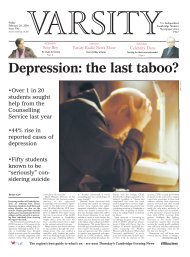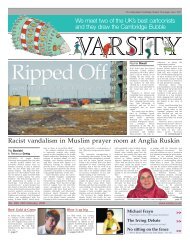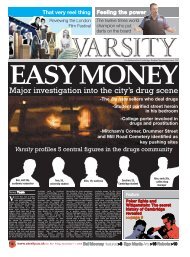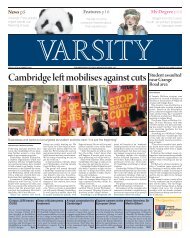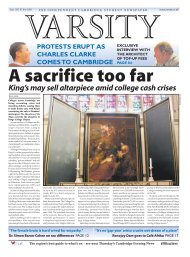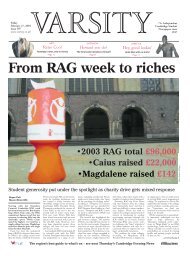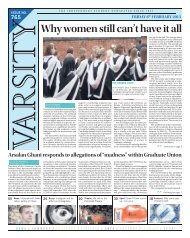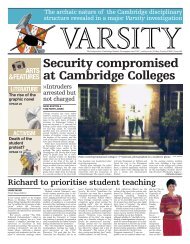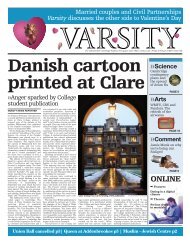16outlook interview18 January 2002focusfashion sciencewww.varsity.cam.ac.ukIn Deep ShitThe regretful but stalwart leader of thefloundering Tories talks candidly toSarah Brealey.Ifirst met IDS, as Iain Duncan-Smithhas christened himself, a year and ahalf ago, before the leadership campaignwas thought of, and I was profoundlyunimpressed. So I was interestedto see whether power had changedhim. He has shorter hair now, to matchhis new abbreviated soubriquet andstatesman-like role, but no more charisma.In fact, he doesn’t even sound animatedwhen talking about his wife andchildren. He says “Um” quite a lot,wrings his hands, and most of his sentencesare punctuated with “you know”,especially when I don’t. He doesn’t seemto enjoy his job very much, and speaksof his regrets about standing for election.But that’s not going to stop himgetting on with it.“I have regrets about it, but I just geton and do it now, you know. But at thetime, I had to consider it very carefullyindeed, which I did – I talked to myfamily about it, and it was only afterthey agreed that I finally decided to doit.”He adds that it took him a week and ahalf from Hague’s resignation to decideto run for leader. Hague himself saysthat his successor begged him to stay on,supporting Hague in his last momentsin a way he never did with Major.“I have regretsabout it, but I justget on and do it.”Hague returned the compliment,recently describing him as “honest, wellinformed,intelligent, thoughtful, hardworking and right about everything hespeaks about”. The two are in regular, ifnot frequent, contact: IDS says that theylast met “for a proper discussion” abouttwo weeks before this interview. Whatdo they talk about? One imagines it canonly be the horrors of the job, Hagueperhaps with a slight smile on his face ashe congratulates himself on being wellout of it.I ask what the factors for and againsthis decision were. “Against were theeffects on my family, and whether I reallywanted to do it. It’s a huge step andnow I’ve done it I realise what a hugestep it really was, and if I’d known then,“If you come intothis for money thenyou’re a mug.”I’m not sure…” He trails off, then continues,“It was a completely differentprocess from anything I’d done before inpolitics… I work more hours than I’veever worked in my life, and I don’t reallysee my family. It’s had a dramaticeffect on our lives.”He never gets as far as the reasons forhis decision, although John Major’sautobiography marked him out as“ambitious” some years ago. Heemphatically rules out any financialmotivation – “If you come into this formoneythen you’re a mug” – but doesn’t mentionanything else.The Labour Party calls him “WilliamHague without the charisma”. In fact,his cosmopolitan tastes, regular churchgoingand four children make him seemmore similar to Tony Blair. He drinksEarl Grey, shops in Austin Reed andmoves Tiffany & Co carrier bags out ofthe way for the photograph. UnlikeBlair, however, there have been nomedia-friendly pictures of him surroundedby an adoring family. “I don’twant my family involved at all, so I’vesaid there will be no pictures of them –which there haven’t been. It’s got nothingto do with them that I’m leader ofthe Conservative Party.” He makes itsound rather like a contagious disease.IDS came to politics late in life, onlybecoming an MP in 1992. Before thathe was in business, and before that inthe army. At times he seems to be visiblywishing he were still in such a regulatedenvironment, where orders arethere to be obeyed. “I think it’sdifficult to lead any politicalparty,” he says. “You’ve got abunch of people whocome here with hopesand aspirations andideas, who want topress their case(quite legitimately),so keeping theparty together isalways a difficultprocess.” Hedescribes the job as“a challenge”,adding, “I don’tthink anyone inthe world’s hadenough experience.”Despite this, he saysthat the ConservativeParty’s “fractious moment”is now over. “I think theparty has made a collectivedecision that it wants tofocus now on getting backinto power.” In response, Iask him about the complaintsof Lord Skidelsky, the formerConservative peer who recentlyleft for the cross-benches, that theparty is too dogmatic. He denies this,saying the reverse is true. “I think oneof the problems with the ConservativeParty is that it’s, more often than not,not dogmatic. The Conservative Party,ironically, has always been a fairlyloose collection of principles.” I amreminded of the words of Nick Kent,the man responsible for co-ordinatingKen Clarke’s rival leadershipbid, who described IDS’s victory asa choice of “ideological purityover electability”.Aware of the Euro’s potential tocontinue to divide the party,he has done his best tominimise the European issue. He stressesthat he is prepared to tolerate disagreement,allowing colleagues to stepdown temporarily from the shadow cabinetif they wish to campaign for a yesvotein the euro referendum. He soundspositively offended by questions on theissue, accusing me of “going round andround” the subject after the secondquestion.“The health service, without reform, isgoing to soak up any money that youthrow at it and not deliver anything at all.”He becomes much happier once wemove on to his favourite topic of publicservices, and the visits he and his frontbench have made to study best practicein other countries. IDS has shown himselfkeen to challenge Labour on theirtraditional territory as the party of publicservices. “That’s the biggest thingthat I want to look at in terms of a radicaloverhaul ofpolicy...Key to the central core of that is thehealth service, which frankly withoutreform is going to soak up any moneythat you throw at it and not deliver anythingat all.”During the leadership election IDSperformed what looked like a startlingU-turn on Section 28, the law that stopscouncils promoting homosexuality.After defending the policy at the beginningof the leadership campaign in June,by early September he was complainingthat the law had become a “totem”which identified the party with hatred.In an interview with the SundayTelegraph, he promised to “look at itagain” if elected leader. When I ask himabout this, he says, “My view on Section28 has been the same throughout,which is that it’s important that childrenhave protection against those who canuse their position of authority to influencethem. How we go about that is thekey question. It may be that Section 28is the right way to do it, it may be thatSection 28 is not the right way to do it,that’s what we’re actually reviewing atthe moment.” Not quite the newliberal beliefs he seemed to beespousing during theelection campaign.He refuses tosay what hisown opinionis,claiming,“ M ypersonalopinionsa r eirrelevant,“I think one of theproblems with theConservative Partyis that it’s, moreoften than not, notdogmatic.”because I’m having a review of this. I’mjust part of the rest of them. We allmake our decisions collectively; that’sthe point about democracy, isn’t it?”He is more candid about the party’sproblems: “We were in government forso long that we became more and morefocussed on running government, andnot on the wider political perspective.We’ve had to recover from that over thelast four to five years and that’s what thisis all about: getting back engaged again,on things like health service, publicservice reform, transport, law andorder.”This will be a slow process. The resultsof the policy review will not comethrough until 2003, with a general electiona few years later. At the moment theTories’ performance is barely animprovement on this time in the lastparliament. “I have no intention of losingthe next election, and I don’t thinkwe will lose the next election,” he insists.But he seems close to admitting that hiswords are at best optimistic, at worstempty rhetoric. “Every politician saysthe same thing,” he admits.He has no patience with questionsabout the fate of the Conservative Partyor of himself personally if they loseanother election, dismissing such speculationas “pointless”. He says, “Of coursethere’s a big hill to climb.” But IDS isnot, it seems, a man to be deterred byhills. “You get on with it, you make itwork and a success and deal with whatevercomes next.” He may not havemuch enthusiasm for it, but there is littledoubt that he will, indeed, get onwith it. Whether he will also makeit a success remains to beseen.
focus18 January 2002www.varsity.cam.ac.ukoutlook interviewfashion science17STARS IN HIS EYESJonathan Zwart discusses the cosmos with Martin Rees, Astronomer RoyalKt, FRS, Astronomer Royal, CambridgeProfessor at the age of thirty, ex-President of the Royal AstonomicalSociety, winner of the 2001 Gruber Prizefor Cosmology, Trustee of the BritishMuseum... Exactly what questions doyou put to a man who has a whole alphabetof accolades after his name? I mulledthe problem over as I wandered round toKings’ to speak to one of the greatestnames in cosmology.He was not the seven foot giant I hadexpected. Austere-looking, but actuallyvery approachable, he immediately setme at my ease in his huge rooms overlookingthe Chapel. I began with hisstring of book publications in the lastfew years. Apparently the material wasalready there in a piecemeal way but hisattitude to writing is suprising for someoneso distinguished. ‘I don’t enjoy it atall’.So I asked him what else drives him inhis work. ‘I think the answer is the sameas you’d get if you asked a fossil hunterthe same question – because it’s a worthwhileexercise in its own right.’ He seesastrophysics as fulfilling several purposes– we have a fundamental human instinctto explore, and the cosmos lets us conductexperiments in much more extremeconditions than are possible in earth laboratories.‘For that reason the best way tounderstand the basic laws and forces ofnature is through astronomy. So it’s areally important part of the generaladvance of science.’Focused and successful, I imaginedhim at our age, staring up at the sky, justknowing he wanted to be an astronomer.But I’d got it wrong again – in fact hehad much in common with many of us.Sir Martin read Maths at Trinity, butdidn’t want to be a straight mathematician,enjoying a more applied style ofthinking. For a long time he was tornbetween Ecomonics and Astrophysics.His particularly providential decisionto go for astrophysics, in the melting potof the late 1950s, is one from which wecan learn: ‘Some advice I could give toanyone starting research is to try andpick a subject where new things are happening,because if you don’t, all you cando is try to solve the problems that theprevious generation got stuck on, andthat’s tough.’ Martin Rees’ own field,cosmology, has remained on a high tothis day. And in his opinion, it will continueto do so for at least the next tenyears, when, for example, there’ll be telescopesthat can detect earth-sized planetsin other solar systems. ‘It would beextremely insightful and attract wideinterest if we can point to a star and saythat star has around it a planet like theearth.’He sees having to explain his work tonon-scientists as a very good thing, toavoid the occupational risk of becomingover-specialised. Through writing andtalking he can also explore the ‘biggerquestions’, which is why you reallyshould take a look at his new book’sunusual perspective. ‘Even if we havefinal equations for the universe, we willnever know what breathes life intothem.’iMartin Rees’ latest book, Our Cosmic Habitat, was publishedlast week.To infinity but not back againGabrielle Bradfield reviews Amir Aczel’s The Mystery of the Aleph: Mathematics, the Kabbalah, and the search for InfinityPublished by Pocket BooksCan a human being contemplate thenature of infinity and survive to tell thetale? Amir D. Aczel, author of the bestsellingFermat’s Last Theorem, tacklesthis question in his new book, TheMystery of the Aleph: Mathematics,Kabbalah and the Search for Infinity.With a broadly historical approach, thebook encompasses a whirlwind tour ofnumber theory, an introduction to mysticalreligious thought and a fascinatinganalysis of the life and work of themathematician Georg Cantor.It is within Cantor’s story that we findthese disparate threads drawn together.This is the story of a deeply complicatedman – a mathematical genius, a manwith a short fuse and bitter enemies,and a man willing to engage in a battlefor understanding that would ultimatelydrive him to insanity. Born inGermany in 1845, Cantor was a numbertheorist who cut his academic teethimmersed in some of the most dramaticdevelopments in the history of numbertheory. But as he pushed back theboundaries of theoretical understanding,he raised the ghosts of fundamentalquestions that have been asked byhuman thinkers from time immemorial.Cantor ended his life at a small mentalhospital to which he had returnedwith ever-increasing frequency as timeprogressed. His bouts of depression andinsanity seemed to follow no specificproblem except for one factor: eachtime Cantor was admitted to the HalleNervenklinik, he had been working onwhat he called ‘his continuum problem.’He wanted to find out the relationshipbetween the different types ofinfinity he had identified. It appearedthat although there were an infinitenumber of discrete counting numbers(1,2,3,4…), there were infinitely more‘real’ numbers lying continuouslybetween each of the counting numbers.This higher level of infinity includes allthe fractions, as well as irrational numberslike square roots and π. So howcould it be that there are different levelsof infinity? How many levels of infinityactually are there? And are they mathematicallyrelated to one another? Thesedisarmingly simple questions proved tobe highly controversial and almostimpossible to solve.But, as Aczel explains, it is not onlymathematicians who have pondered themysteries of infinity. Mystical Jewishthinkers of the Kabbalah have beenaddressing the issue for centuries. Buttraditionally, laymen have been discouragedfrom pursuing Kabbalah toodeeply for fear that it will drive them toinsanity. Aczel relates the story of fourgreat scholars who attempted to meditateon the nature of the infinite. Onlyone survived the experience. Of theother three, “one gazed at the infinitelight and died, for his soul so longed forit that he instantly shed his physicalbody and was no more;” anotherbecame a heretic after he looked intothe light and saw many gods instead ofone. The third lost his mind when hecould not reconcile ordinary life withhis vision.The writings of the Kabbalists appearto have much in common with those oflater mathematicians. So, sadly, do theirtales of mental imbalance. Aczel portraysthese mathematicians withpoignancy and passion. How is it thatman can meditate on a reality beyondthe limitations of his own mind? Whatdoes this tell us about the nature ofGod, if indeed there is a God? How cannumbers and spirituality be so closelyrelated? In The Mystery of the Aleph,Amir D.Aczel raises all these questionswithout letting the complexity of thesubject matter cloud his clear style. Itmight sound unlikely, but this is actuallya very easy read and one which willleave you with plenty to think over –whether you are a mathematician, or anartist interested in finding out about themore poetic side of mathematics.ETHICS: SHOULD THE MORNING AFTER PILL BE MORE AVAILABLE?The morning after pill should be availableover the counter, argues Amy LawrenceWhen asked, nine out of ten womenhaving an abortion said they wouldhave taken the morning after pill, hadthey known how to get it. So why didn’tthey?Fortunately, pharmacists in Britainare now allowed to give out the morningafter pill to women over 16 years ofage. This makes it much more accessibleto people who don’t want to visittheir family doctor or can’t get to afamily planning clinic. Pharmacistsdon’t just give it out to anybody whoasks; they have to adhere to aGovernment procedure which includesmaking sure the woman takes the firsttablet in their presence.Time is crucial – the longer the delaybefore taking this pill, the less effectiveit will be, say researchers at the WorldHealth Organisation. In fact, thewindow is very small... the chance ofconception is increased by 50% if itis taken more than twelve hoursafter sex. So putting more timewastingobstacles in the way ofpeople who need it will makeit much less effective.In 1998 there were nearly a quarterof a million abortions in Britain. Withthe introduction of this new scheme,we can be sure this statistic willdecrease.Safety worries and unpleasent side-effects: isit really worth the risk? asks Hannah FullerThe morning after pill is a form of emergencycontraception that is becoming anincreasingly popular method of birthcontrol. We assume that because it iswidely available, it must be safe – butthere is striking evidence that this is notthe case.Both the normal contraceptive pill andthe morning after pill contain the hormonesoestrogen and progesterone. A fifteen-year-oldgirl recently died from astroke as a result of taking the normalcontraceptive pill – the morningafter pill is six times as strong.There are several unpleasant sideeffects from taking the morning after pill.Fifty percent of women suffer from nauseaand twenty percent vomiting.However, more seriously, there is anincreased risk of ectopic pregnancy, bloodclots in the lungs and legs, heart attacks,liver tumours, gall bladder disease andhigh blood pressure.If the morning after pill were readilyavailable, more women would rely on itas a standard form of contraception. Aserious problem with this is that it offersno protection against sexually transmitteddiseases, including AIDS.There have been no long-term studiesto show whether women are permanentlydamaged, or at increased risk from canceras a result of taking such high doses ofchemicals. Is it really worth the risk?


